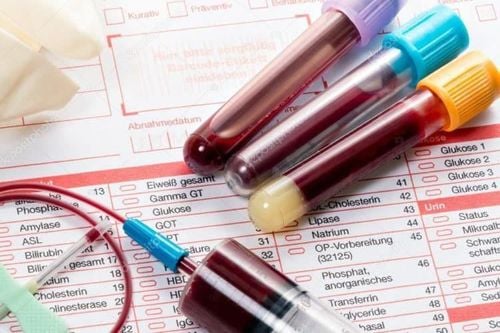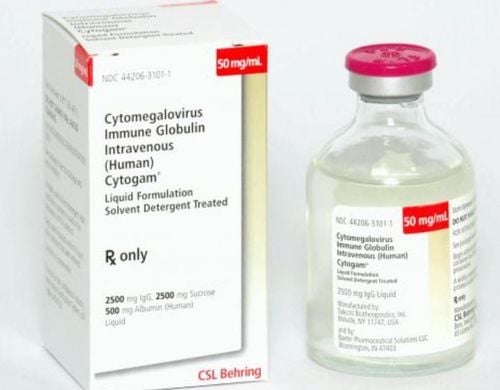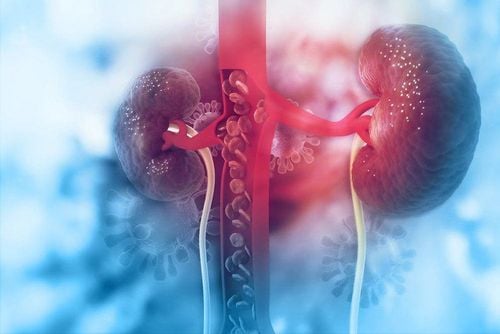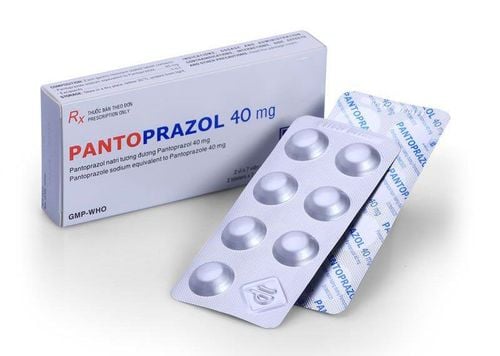This is an automatically translated article.
When symptoms of kidney failure are present, the patient should see a nephrologist and perform tests to assess kidney function because testing is the only way to confirm the condition, and Kidney function tests should also be performed annually because most people with early kidney failure will have no symptoms. So, what are the tests to evaluate kidney function and what are the indicators of kidney function? Let's learn more through the article below.
1. Tests to check kidney function
1.1. Functions of the kidneys
The kidneys are a pair of bean-shaped organs located at the bottom of the ribcage to the right and left of the spine. They are part of the urinary tract and perform a number of essential roles and functions in the body.
Inside the kidney there are about a million small blood-filtering units called nephrons. In each nephron, blood is continuously filtered through a cluster of repeating blood vessels, called a glomerulus, which allows water and small molecules to pass through but retains blood cells, proteins such as albumin, and large molecules. than. Attached to each glomerulus are tubes (tubules) with several segments that collect fluid and molecules that pass through the glomerulus, reabsorb what can be reused by the body, adding other molecules through the glomerulus. a process called excretion and, ultimately, regulates how much water is ultimately eliminated along with waste in the form of urine.

Thận là bộ phận nằm ở bên trái và bên phải của cột sống
Besides removing waste and helping to regulate the amount of water in the body, these activities allow the kidneys to maintain a normal chemical balance in the body. Among the important substances that the kidneys help regulate are sodium, potassium, chloride, bicarbonate, calcium, phosphorus and magnesium. The right balance of these substances is very important. When the kidneys are not working properly, the levels of these substances in the blood can be abnormal and waste products and fluids can build up to dangerous levels in the blood, which can be life-threatening. The kidneys also have a number of other roles in maintaining a healthy body, including the production of a hormone that stimulates the production of red blood cells (called erythropoietin) and the production of a hormone that helps maintain normal blood pressure (called renin). , and a form of vitamin D to a more active form, which enhances calcium absorption. If the kidneys are not working properly, waste products can build up in the blood and the amount of fluid can increase to dangerous amounts, cause damage to the body, or be life-threatening. Many conditions and diseases can lead to kidney damage. The most common causes and major risk factors for kidney disease are diabetes and hypertension.
Signs you need to check kidney function :
Swelling or puffiness of the eyes, especially around the eyes or in the face, wrists, abdomen, thighs or ankles Foamy, bloody or coffee-colored urine Decreased amount urinating Problems urinating, such as a burning sensation or unusual discharge when urinating, or a change in the frequency of urination, especially at night Pain in the middle of the back, below the ribs, near the kidneys Only Indications need to check kidney function:
Periodic health check every year, only simple tests are oriented: blood chemistry test, urinalysis, complete blood count, abdominal ultrasound. Family history of hereditary kidney diseases or having a relative with kidney failure: blood chemistry tests, urinalysis, complete blood count, abdominal ultrasound, specific genetic tests. When there are clinical manifestations of renal failure: blood biochemical tests, urinalysis, complete blood count, abdominal ultrasound. If other causes of urinary obstruction are found, further imaging tests should be performed. If no obstruction is found, a kidney biopsy may be performed. Having a history of surgical intervention on the urinary tract or abdominal organs: blood biochemistry tests, urinalysis, complete blood count, abdominal ultrasound. If there are signs of obstruction: do further imaging tests.
1.2. The most essential test to check for kidney disease
Blood test that checks your GFR (glomerular filtration rate): GFR (glomerular filtration rate) is the best test to measure your level of kidney function and determine the stage of your kidney disease. Your doctor can calculate it from your creatinine blood test results, your age, body size, and gender. Your GFR tells your doctor the stage of your kidney disease and helps your doctor plan treatment. If your GFR number is low, your kidneys are not working as well as they should. The earlier kidney disease is detected, the better the chance of slowing or stopping its progression. Normal levels of glomerular filtration rate (GFR) vary with age, sex, and body size. The normal glomerular filtration rate (GFR) in young adults is about 120 to 130 mL/min per 1.73 m2 and decreases with age. A normal result is higher than 90 mL/min/1.73m2. If the results are consistently below 60 mL/min/1.73 m2 for at least three months, this confirms that the person has chronic kidney disease.
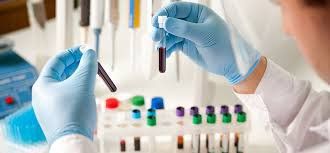
Xét nghiệm mức lọc thận (GFR) là điều rất cần thiết
In addition, blood tests reveal other abnormal indicators of kidney function such as:
+ High level of acidity (acidosis)
+ Anemia (not enough red blood cells or hemoglobin, a protein in the cells) red blood cells carry oxygen)
+ High levels of potassium (hyperkalemia)
+ Low salt levels (hyponatremia)
+ Changes in calcium and phosphate levels.
Urine test that measures urine albumin for signs of kidney damage: Albumin is a major protein normally found in your blood. A healthy kidney has no albumin in the urine. Damaged kidneys allow some albumin to pass into the urine. The less albumin in the urine, the better. Normal urinary protein excretion is less than 150 mg/day and less than 30 mg of albumin/day. Small amounts of albumin in the urine are sometimes called urine microalbumin or microalbuminuria. “Micro albuminuria” is gradually being replaced by the term “albuminuria,” which refers to any elevation of albumin in the urine. Elevated urine microalbumin levels can be temporarily seen with conditions such as infection, stress, pregnancy, diet, cold exposure, or heavy exercise.
2. Indicators to evaluate kidney function
2.1 Indicators in blood test
Blood urea test : When protein is broken down, a product in the form of urea is produced. This is considered a type of waste that will be filtered through the glomeruli and then excreted through the urine. If kidney function is impaired, blood urea levels will be high. Through the blood urea nitrogen test, it can help assess whether kidney function is stable or not. When blood urea value is in the range: 2.5 - 7.5 mmol / l, it shows normal kidney function index. When the blood urea value is high, the patient is prone to diseases such as nephritis, glomerulonephritis, signs of kidney stones, ureteral stones, or dehydration due to too high fever, diarrhea, congestive heart failure. In case the patient eats foods that provide little protein for the body, has impaired liver function or receives fluids, the value of urea in the blood will decrease. Serum creatinine test: When muscle creatine is degraded, it will be converted to creatinine, which is mainly eliminated by the kidneys. Due to the Creatinine index, it will be possible to assess kidney function.
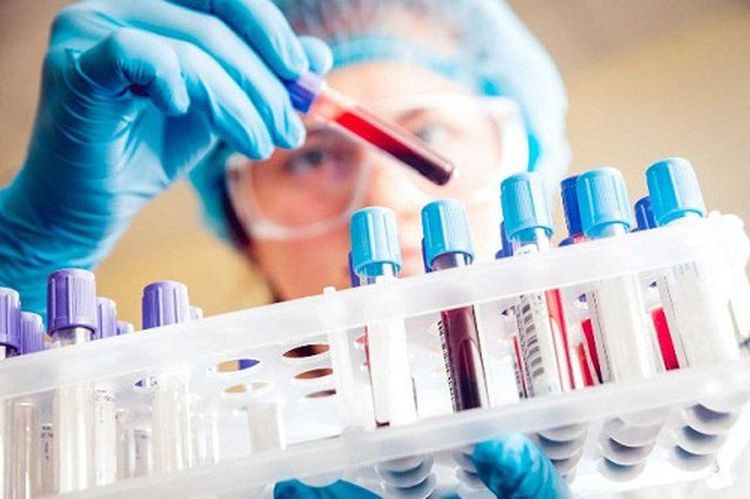
Thận cần được xét nghiệm máu và huyết thanh để được chuẩn đoán chính xác nhất
Normal creatinine levels:
+ Men: 0.6 - 1.2 mg/dl.
+ Female: 0.5 - 1.1 mg/dl.
If the creatinine level exceeds the allowable level, this is a sign of kidney dysfunction, because the ability to filter creatinine is impaired and the concentration of this substance in the blood will rise higher than normal.
Creatinine index also reflects the stage of renal failure as follows:
+ Renal failure grade I: creatinine concentration <130 mmol/l.
+ Renal failure grade II: creatinine level in the range of 130 - 299 mmol / l.
+ Renal failure grade III: creatinine level in the range of 300-899 mmol / l.
+ Renal failure grade IV: creatinine level higher than 900 mmol / l.
Blood creatinine test is used to evaluate kidney function. It is often ordered along with a BUN (blood urea nitrogen) test or as part of a basic or comprehensive metabolic panel, groups of tests performed to evaluate the function of major body organs. Basic or comprehensive metabolic panel tests are used to screen healthy individuals during routine physical exams and to help evaluate people with acute or chronic illness in the emergency room and/or hospital institute. Sometimes, creatinine may be done as part of a kidney panel to evaluate kidney function.
If the blood creatinine and urea nitrogen (BUN) test is found to be abnormal or if someone has an underlying condition affecting the kidneys, such as diabetes or high blood pressure, then the blood creatinine and urea nitrogen test (BUN) can be used to monitor renal dysfunction and the effectiveness of treatment. Blood creatinine and blood urea nitrogen (BUN) tests may also be ordered to evaluate kidney function prior to certain procedures, such as CT scans (computed tomography), which may require the use of taking medicines that can damage the kidneys.
However, the test results of creatinine index are also influenced by many factors such as age, gender and geographical location of each person. So when there is doubt about the accuracy of the creatinine test results, the doctor will order the patient to perform another test, which is cystatin C in the blood. The normal value of cystatin C in the blood ranges: 0.31 - 0.99 mg/L.
Electrolyte : Electrolyte imbalance mainly due to impaired kidney function, including: + Sodium (Sodium). ): The normal value of sodium in the blood is in the range of 135 - 145 mmol/L. But for patients with renal failure, blood sodium levels are significantly reduced due to losses through the gastrointestinal tract, through the kidneys, and through the skin, or due to excess water.
+ Potassium (Potassium): The normal value of Potassium in the blood ranges from 3.5 - 4.5 mmol / L. For patients with kidney failure, the poor elimination of toxic substances leads to potassium levels in the blood. high blood. + Blood calcium: The normal value of calcium in the blood for people in good health is about 2.2 - 2.6 mmol / L. In patients with kidney failure, blood calcium levels decrease but phosphate increases.
Acid-base balance disorder: The acid-base disorder test is one of the most common kidney function tests ordered when kidney disease is suspected. The pH level in the blood is average when it is in the range of 7.37 - 7.43. If kidney function is impaired, it increases the acid level in the blood, which in turn helps detect kidney problems. Blood uric acid levels: Normal blood uric acid levels are in the range: + Men: 180 - 420 mmol/l.
+ Female: 150 - 360 mmol/l.
This test is used when a patient is suspected of having kidney disease or even gout. If the level of uric acid in the blood is high, it means that the patient has kidney disease or gout, at this time, more tests will be conducted and treatment methods will be given.
Other biochemical tests: + Total blood cell analysis: When the red blood cell count decreases, the patient's likelihood of chronic kidney failure.
+ Serum Albumin: For healthy people, serum Albumin is at 35-50g/L, which accounts for 50-60% of total protein. But when there is acute glomerulonephritis, the serum albumin index is low.
+ Total protein in plasma: For healthy people, it is from 60 - 80 g / L, but when there is a problem with kidney filtration, the total protein index tends to decrease.
2.2 Indicators in urine test
Total urinalysis: Normal urine density is in the range of 1.01 - 1.020. For patients with impaired renal function, the incidence is lower due to decreased urine concentration. Protein in the urine sample also plays a role in assisting the doctor in deciding whether to appoint a patient to have a 24-hour quantitative proteinuria test. Quantitative 24-hour proteinuria: For people with normal health, protein in the urine will range from 0 - 0.2g/l/24h. But when the patient has kidney disease such as kidney failure, glomerular damage, hypertension, diabetes, the proteinuria in the test sample usually increases at 0.3g/l/24h. Urine protein/creatinine ratio (UP/CR: used to monitor a person with known kidney disease or damage or to screen people regularly when they are taking medications that may affect their kidney function) surname.
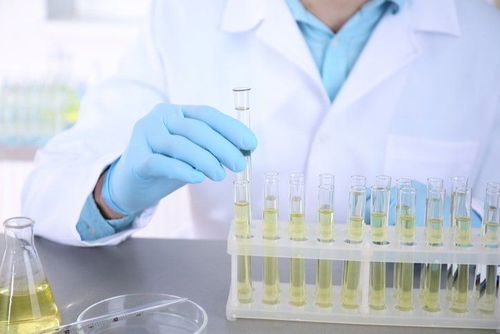
Kiểm tra thận cần được xét nghiệm và phân tích nước tiểu
Urine albumin: this test can be done on a 24-hour urine sample or can measure both albumin and urine creatinine in a random urine sample and can calculate the albumin/creatinine ratio (ACR). The American Diabetes Association recommends the albumin/creatinine ratio (ACR) as the preferred test for screening for albumin in the urine (microalbuminuria). It is used to screen people for chronic conditions, such as diabetes and high blood pressure (hypertension) that put them at high risk of developing kidney disease.
2.3 Other laboratory parameters
X-ray: To comprehensively evaluate kidney function, doctors often combine both X-ray methods with urine and blood tests to get more accurate conclusions. Abdominal ultrasound: Through abdominal ultrasound will help doctors detect hydronephrosis due to ureteral obstruction. Hydronephrosis on both sides easily leads to the risk of acute or chronic renal failure, in addition, it also helps to detect congenital or hereditary polycystic kidney. Based on the sonographic image, the kidneys will be smaller than normal, lose cortical differentiation, structural changes, or have many cysts, which suggest a risk of chronic kidney disease. In addition, ultrasound can also detect tumors in the kidney, also known as kidney stones. CT scan: CT scan is most often used when doctors suspect that a patient has kidney failure or a urinary tract obstruction. Thanks to the method of using X-rays to target a single location in the abdominal cavity, it allows a clear image of the entire urinary system. To detect the cause of the ureteral obstruction and the location of the obstruction, a CT scan will be combined with contrast injection to help visualize the entire urinary tract. Renal scintigraphy with radioisotope : This is the only test method capable of evaluating bilateral renal function and helping to evaluate the degree of ureteral obstruction with high efficiency. Thanks to this method, the doctor will clearly see the filtering function of each kidney, the degree of participation in the function of each kidney, the perfusion rate.
3. Notes when testing kidney function
Normally, to perform kidney function tests, patients must fast for at least 8-10 hours before the procedure. Do not use stimulants will affect the test results. You should limit protein-rich foods that can increase uric acid in the blood. Patients should be consulted by their doctor before taking the test. In addition, it is necessary to inform the doctor about the drugs being used to avoid affecting the results.
Please dial HOTLINE for more information or register for an appointment HERE. Download MyVinmec app to make appointments faster and to manage your bookings easily.




